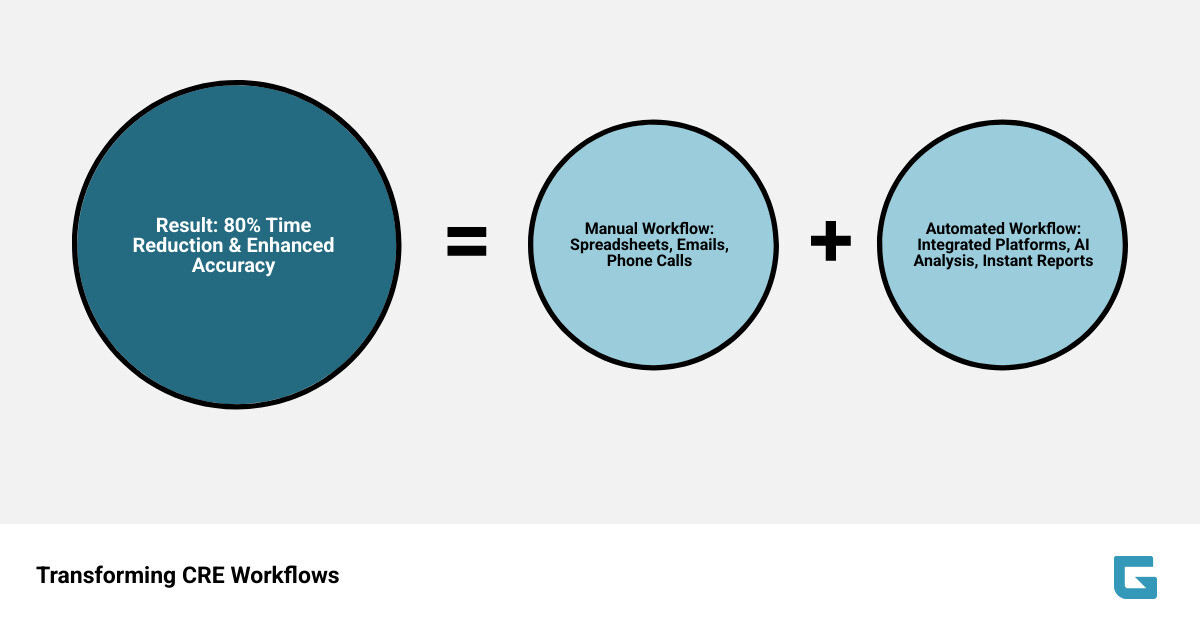Beyond Spreadsheets: A Guide to Commercial Real Estate Automation
Written by: Clyde Christian Anderson
Why Commercial Real Estate Automation is Essential in 2025

Commercial real estate automation uses technology to streamline repetitive tasks, reduce manual errors, and accelerate decision-making across property management, leasing, and investment processes. Key areas ripe for automation include:
- Lead Management: Automated capture, scoring, and follow-up.
- Property Marketing: Listing syndication across multiple platforms.
- Deal Tracking: Progress monitoring and stakeholder notifications.
- Financial Operations: Rent collection, CAM reconciliation, and reporting.
- Site Selection: AI-powered market analysis and location evaluation.
- Document Management: Contract generation and lease abstraction.
The commercial real estate (CRE) industry is undergoing a fundamental shift. According to STRATFOLIO research, automation can save nearly 80% of time and thousands of dollars each month for CRE owners and operators. Meanwhile, real estate agents save an average of 20 hours per week by automating activities like data entry and email follow-ups.
This isn't just about efficiency—it's about survival. As one industry expert noted: "If you aren't experimenting with and using AI tools to streamline tasks, you are behind the curve." The data supports this urgency: leads contacted within the first five minutes are 21 times more likely to convert, making automated response systems critical for competitive advantage.
Today's CRE professionals are leveraging AI for predictive market analysis, automated site selection, and intelligent deal tracking. These tools don't replace human expertise; they amplify it, allowing teams to evaluate five times more sites efficiently while focusing on high-value activities like negotiation and client relationships.
I'm Clyde Christian Anderson, Founder and CEO of GrowthFactor.ai, where we've helped retail clients open up $1.6M in cash flow through AI-powered site selection and commercial real estate automation. Having worked in retail real estate from warehouse operations to investment banking at Wells Fargo, I've seen how the right automation tools can transform decision-making speed and accuracy.

Commercial real estate automation vocabulary:
- ai for lease management
- ai in property management
The Transformative Benefits of Automating CRE Processes
Picture this: you're a commercial real estate professional drowning in spreadsheets, chasing down paperwork, and missing hot leads because you're buried in administrative tasks. Sound familiar? Commercial real estate automation changes this entire game, changing how we work and dramatically improving the bottom line.
The benefits go far beyond simple time savings. We're talking about significant cost savings, improved accuracy that eliminates human error, and better lead conversion rates. Add in scalability, data-driven decision-making, and a distinct competitive advantage, and automation becomes a clear-cut investment.
When you automate routine processes, you work smarter, not just faster. Your team can focus on what humans do best: building relationships, negotiating complex deals, and providing strategic insights that no machine can replicate. For a deeper dive into how AI specifically empowers brokers, check out our guide on AI for Real Estate Brokers.
Boosting Efficiency and Profitability
By automating administrative tasks, you free up a significant portion of your workweek. Instead of manually entering data or chasing down routine follow-ups, you can build relationships with key clients, analyze market trends, or hone your negotiation skills for the next big deal.
This time savings translates directly into streamlined operations and higher profitability. When your processes run smoothly without constant human intervention, you can maximize your Net Operating Income (NOI) while reducing overhead. It's like having a tireless assistant who never makes data entry mistakes, handling the tedious work while you focus on high-value activities.
Accelerating Lead Conversion and Scaling Your Business
In commercial real estate, response time is everything. Commercial real estate automation ensures you never miss that critical first contact. With instant lead response systems working around the clock, your business operates 24/7, giving every inquiry immediate attention.
Beyond speed, automation enables personalized client communication at scale. Your CRM can track preferences and tailor follow-ups based on where each prospect is in your pipeline. This means you can handle more leads, manage more properties, and track more deals without adding proportional headcount.
Your automated systems grow with your business, maintaining a personal touch as your client base expands. According to the National Association of Realtors, technology adoption is essential for staying competitive. The firms that accept automation today are the ones that will dominate tomorrow's CRE landscape.
Key CRE Processes Ripe for Automation
The beauty of commercial real estate automation lies in its ability to transform repetitive tasks into smooth, intelligent workflows. The key is identifying which processes consume your time without adding significant value, freeing you up to focus on building relationships and closing deals.

Identifying Key Processes for Commercial Real Estate Automation
Let's start with the client-facing side of your business. Here are several tasks ripe for automation:
- Automated Property Listings: Syndicate your properties across multiple platforms with a single click.
- Social Media Management: Schedule posts, track engagement, and analyze performance automatically.
- Lead Capture and Scoring: Collect and qualify leads from your website, social media, and email campaigns.
- Email Drip Campaigns: Nurture leads with personalized, timely messages triggered by specific actions.
- Task Management: Assign tasks, set deadlines, and track progress across your team to ensure nothing is missed.
- Virtual Tours and Showings: Offer 24/7 access to properties with automated scheduling and delivery.
- Data Entry and Document Processing: Eliminate hours spent manually copying information between systems.
For teams looking to streamline their deal management process, our guide on Real Estate Deal Tracking Software offers practical insights into automating deal workflows.
Streamlining Operations and Financials
The back-office side of commercial real estate is where automation truly shines. These processes are essential and perfect candidates for automation:
- Lease Abstraction: Automatically pull critical information from lease documents, such as dates, terms, and financial details, saving hours of manual review.
- Rent Collection: Automate reminders, payment processing, and late fee management. With over 60% of renters paying online, this is a must-have.
- Maintenance Requests: Streamline the process from tenant submission to vendor assignment and completion tracking.
- CAM Reconciliation: Automate the calculation of shared expenses, allocation of costs, and generation of accurate billing statements.
- Financial Reporting: Generate real-time dashboards showing property performance, cash flow, and key metrics without manual data compilation.
- Contract Generation: Use templates and property data to create standardized agreements, speeding up deal closures.
These automated processes create a foundation for scalable growth. To explore how AI can revolutionize your lease management specifically, check out our article on AI-Powered Lease Management.
The Role of AI in Commercial Real Estate Automation
When we talk about commercial real estate automation, it's crucial to understand that AI isn't just another form of automation—it's a game changer. While traditional automation handles repetitive, rule-based tasks, AI simulates human intelligence to tackle complex challenges that require learning, reasoning, and decision-making.
Think of it this way: automation is an assistant who follows instructions perfectly. AI is a brilliant analyst who spots patterns, makes predictions, and offers insights you might have missed. AI's key contributions include predictive analytics to forecast market trends and Natural Language Processing (NLP) to understand documents and emails.
AI agents, or "digital coworkers," can autonomously execute multi-step workflows, while machine learning models continuously improve their performance over time. As highlighted in Forbes, embracing AI in real estate is essential for staying competitive.
How AI Lifts Market Analysis and Site Selection
At GrowthFactor, AI is at the heart of our approach to market analysis and retail site selection. AI-driven market trend analysis allows us to spot emerging opportunities and potential risks with precision. Our AI tools perform predictive property valuation, understanding how various factors will impact asset values over time.
AI can analyze vast amounts of demographic data for a detailed understanding of target customers and interpret foot traffic patterns to provide insights into consumer behavior and site viability. This intelligence allows for thorough competitor analysis and ensures investment decisions are backed by robust data.
When our clients use our AI Agent Waldo, they can automate qualification and evaluation processes, ensuring that every decision is data-driven. For deeper insights, explore our resources on Automated Market Analysis and Leveraging AI for Retail Site Selection.
Leading AI Tools and Technologies
The landscape of AI tools for commercial real estate automation is evolving rapidly. These innovations fall into several key categories:
| AI Technology Type | Description & Key Features | Examples (General) |
|---|---|---|
| Generative AI | Creates new content (text, images, code) based on prompts; useful for drafting, research, and summarization. | ChatGPT, Gemini |
| AI Agentic Platforms | Autonomous AI systems that execute multi-step workflows across applications, acting as "digital coworkers." | Platforms that automate multi-step business processes |
| Data Analytics Platforms | Analyzes large datasets to identify trends, predict outcomes, and generate actionable insights for strategic decision-making. | Location intelligence and market analysis software |
| Document Parsing Tools | Extracts structured data from unstructured documents (leases, contracts) using AI, OCR, and NLP. | AI-powered data extraction and lease abstraction tools |
| AI-powered CRMs | Integrates AI to automate lead scoring, personalize communication, predict client needs, and optimize sales funnels. | CRMs with built-in AI for sales and marketing |
The real power of AI lies in its ability to process vast amounts of information and provide insights that would take humans weeks to uncover. For even deeper insights into data-driven decision making, check out our guide on AI-Driven Analytics.
A Practical Guide to Implementing Automation
Embracing commercial real estate automation is about amplifying your expertise, not replacing it. By automating tedious tasks, you free up mental space for the strategic thinking that moves deals forward. Think of automation as your personal assistant who never takes sick days.

Choosing and Integrating the Right Tools
Before diving in, assess your needs. The best tools solve real problems without creating new ones. Consider these factors:
- Identify Pain Points: Pinpoint your most time-consuming, repetitive tasks. These are your best candidates for automation.
- Prioritize Integration: Your tools must work together seamlessly. A system where your lead capture, CRM, and email marketing platforms communicate automatically is where the magic happens.
- Ensure Scalability: Choose solutions that can grow with your business. Our Core ($500), Growth ($1,500), and Enterprise plans are designed to scale with your operational needs.
- Focus on User Experience: A powerful tool is useless if your team won't use it. Look for intuitive interfaces and clear workflows.
For complex processes, user-friendly automation is even more critical—learn more about automating property due diligence.
Best Practices for Implementing Commercial Real Estate Automation
- Start Small and Scale: Don't try to automate everything at once. Pick one frustrating process, perfect it, and then move to the next. This builds momentum and demonstrates value to your team.
- Define Clear Objectives: Set specific, measurable goals. Instead of "be more efficient," aim for "reduce lead response time to under 30 minutes."
- Monitor Performance: Use Key Performance Indicators (KPIs) like time saved, error reduction, or conversion improvements to track your ROI.
- Involve Your Team: Your team's feedback is invaluable. They use these tools daily and can spot issues and opportunities. Foster an environment of continuous improvement.
- Manage Change Effectively: Be transparent about how automation will improve roles, not eliminate them. Focus on freeing them from busy work to perform more strategic, relationship-building activities.
- Prioritize Data Security: Ensure your chosen tools have robust security measures like encryption and access controls to protect sensitive client and financial data.
- Watch for Algorithmic Bias: Regularly audit AI-driven decisions to prevent biases in areas like property valuation or tenant screening, which can lead to legal issues and missed opportunities.
The Future of Automation in Commercial Real Estate
The future of commercial real estate automation is about fundamentally reimagining how we interact with buildings, data, and deals. We're entering an era where properties think, contracts execute themselves, and AI agents become trusted members of our teams.

Key trends are already shaping this future:
- The Internet of Things (IoT): Smart buildings use sensors to optimize energy, predict maintenance needs, and improve tenant experiences, making properties more valuable and sustainable.
- Blockchain and Smart Contracts: These self-executing agreements can automate transactions, from ownership transfers to rental payments, increasing speed and security.
- Hyper-Personalization: AI systems will analyze tenant needs to recommend ideal properties and deliver laser-focused marketing, adapting experiences in real-time.
- Digital Twins: These virtual replicas of physical buildings allow us to simulate renovations or new tenant mixes to predict impacts on costs and foot traffic before committing capital.
The most profound shift is the rise of "digital coworkers." Advanced AI agents—like our own AI Agent Waldo—don't just assist human teams; they autonomously handle complex, multi-step processes. They can qualify sites, conduct initial market analysis, and generate comprehensive reports while human experts focus on strategy, negotiation, and client relationships.
This evolution allows us to evaluate more opportunities, make faster decisions, and serve clients at a level previously impossible. As we explore in our article on The Future of Retail Site Selection, this integration of AI isn't just changing how we work—it's expanding what we can accomplish.
Frequently Asked Questions about Commercial Real Estate Automation
As we steer commercial real estate automation, several key questions often arise. Here are clear, concise answers to the most common inquiries.
What is the difference between real estate automation and AI?
Think of it this way: automation follows rules, while AI learns and reasons. Automation is perfect for repetitive, rule-based tasks like sending scheduled emails or processing rent payments. It executes instructions perfectly every time. AI, on the other hand, simulates human intelligence. It can analyze complex data, understand language in a lease, predict market trends, and make recommendations. AI is the most advanced form of automation, focused on thinking and learning rather than just doing.
Can automation and AI replace commercial real estate agents?
No. Commercial real estate automation and AI cannot replace the essential human elements of the industry. Technology excels at handling data analysis, lead follow-ups, and document processing. However, it cannot replicate the trust-building, nuanced negotiation, and strategic problem-solving that define a great agent. Technology is a powerful ally that handles the administrative burden, freeing you to focus on what humans do best: connect, strategize, and close deals.
What are the biggest challenges when implementing automation?
Implementing commercial real estate automation comes with challenges, but they are manageable with proper planning. The most common problems include:
- Initial Cost and Integration: Setting up new systems and ensuring they work with your existing software can require an upfront investment. At GrowthFactor, our tiered plans (Core, Growth, and Enterprise) are designed to scale with your business and minimize integration pain.
- Data Security: Automating processes with sensitive data requires robust cybersecurity measures to protect your business and clients.
- Employee Resistance: Change can be met with fear. Clear communication is key to showing your team how automation improves their roles by eliminating tedious work, rather than replacing them.
- Choosing the Right Tools: The market is crowded. It's crucial to select solutions that align with your specific business needs and workflows.
- Algorithmic Bias: AI models can reflect biases in their training data. Regular audits and human oversight are necessary to ensure fair and accurate automated decisions.
Conclusion
The journey through commercial real estate automation makes one thing clear: this technology is no longer just helpful—it's the foundation for success in 2025 and beyond. The days of being buried in spreadsheets and manual processes are over.
Automation doesn't replace the human element; it amplifies it. By handling repetitive tasks, it frees us to focus on what we do best: building genuine relationships, navigating complex negotiations, and providing strategic insights that only a human expert can.
The shift to an AI-first mindset is about becoming more human, not more robotic. When AI handles the heavy lifting of market analysis and site evaluation, we can be the trusted advisors our clients need.
At GrowthFactor, we see this change daily. Our AI Agent Waldo empowers teams to make faster, smarter decisions backed by comprehensive data, turning weeks of research into a streamlined, efficient process. This isn't just efficiency; it's a competitive advantage.
Ready to see how intelligent automation can revolutionize your retail real estate strategy? Find out how AI can revolutionize your site selection process and find what it means to work with a true digital coworker.
Citations
The human algorithm
Request Your demo
Schedule meeting
Or submit your information below and we'll be in touch to schedule.



